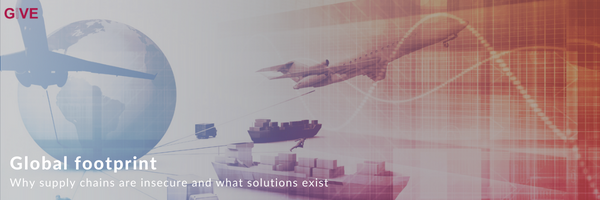
photo credit: kentoh ür Getty Images (via Canva pro)
Global Footprint - Uncertain supply chains and possible solutions
Uncertain supply chains represent a serious problem for companies in the automotive sector. Even a shortage of small components can shut down the entire production and lead to an enormous loss of revenue.
But why are supply chains uncertain, and what are possible solutions? In the following article, we address these questions:
Why are supply chains uncertain?
Currently, components mostly come from production facilities in Asia. In the past, cheap manufacturing costs led many companies to outsource their entire production from Europe to Asia. Because at the beginning of this development, the favorable costs outweighed the long transport route. The supply chain settled in over time and there was a steady flow of containers to Europe.
This prompted many companies to abandon expensive local warehouses and rely on just-in-time delivery. Because supplies were always available. But the signs have changed. During the Corona pandemic, deliveries from Asia came to a halt. As a result, well-established supply chains collapsed and have not recovered until now. Because of the lack of containers, the lack of capacity at the ports, and not least because of the long transport route, the backlogs can hardly be made up. In addition, transport costs have increased drastically.
Challenges in supply chains and possible solutions
The production of some components is currently hardly possible outside Asia. But uncertain supply chains and high costs are making Asia less and less attractive as a production location. After all, the domestic industry needs reliability. The long transport route is also proving to be an ever greater problem because delays can hardly be compensated for.
One solution could therefore be to bring production back to Central and Eastern Europe (CEE) again. Because in case of breakdowns, replacements could be procured quickly. In addition, the supply chain would no longer be so dependent on ships, containers, and ports, which often represent a bottleneck.
Manufacturing in Central or Eastern Europe has many advantages as well. But what about the costs? Although there are currently locations in Europe, more are needed, for which high investments are initially required. And production is also more expensive than in Asia. But the increased transport costs and the loss of sales due to missing components increasingly outweigh these disadvantages.
Especially the production location in Europe also serves quality assurance. Because defective components can be complained about and replaced quickly. In addition, buyers can travel more easily to the producers and check the quality and working conditions, which ensures transparency.
Environmental issues will also become increasingly important in the future. The closer the production sites are, the lower the CO₂ emissions, which is also an advantage.
Can CEE replace Asia?
In the short term, it is certainly not possible to bring all production back to Europe. But the keyword for resilient supply chains is diversification. If components are purchased from several locations, the dependence on only one supplier can be reduced. In this scenario, Central and Eastern Europe locations are an important building block. This is because deliveries can be made much faster and the quality of the products is easier to control. Eliminated customs and transport costs, as well as more reliability, therefore make CEE locations attractive components in a functioning supply chain.
If you would like to know more about the possibilities of production at CEE locations, we would be happy to advise you.




